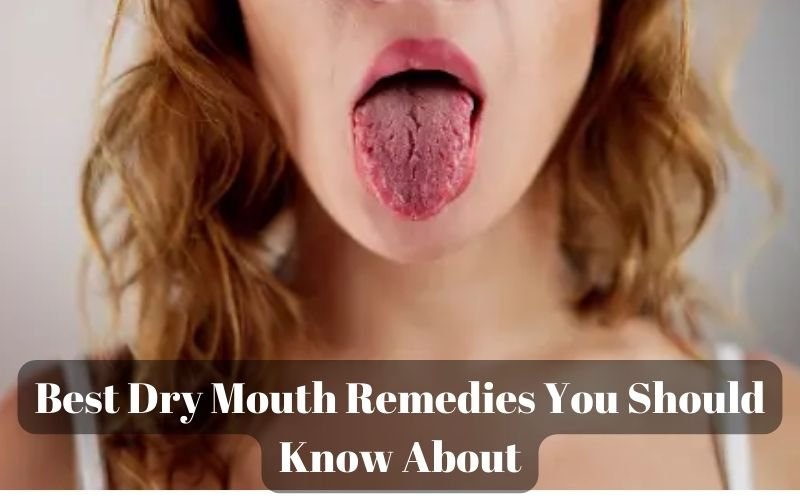Dry mouth is also known as xerostomia. This happens when the salivary glands in your mouth don’t produce enough saliva. This condition causes dryness or a feeling of dryness in your mouth. It can also lead to additional symptoms like halitosis, throat dryness, and cracked lips. Saliva is an essential part of your digestive process. This helps to moisten and break down your food. It is also a major defense mechanism to help your body maintain good dental health, protecting your mouth from gum disease and tooth decay. Dry mouth in itself is not a serious medical condition. However, it is sometimes a symptom of another underlying condition that requires treatment. It can also cause complications like tooth decay and mouth ulcers.
What Causes Dry Mouth

Many factors can cause dry mouth. Additionally, simply having a dry mouth does not mean you have an underlying condition. If you think another condition is the cause or if you notice other symptoms, it’s important to talk to your doctor about diagnosis and treatment options. Possible causes of dry mouth:
Also Read- Dealing with Oral Thrush: Causes and Solutions
Dehydration
Dehydration occurs when your body loses too much fluid without replenishing. This may be due to vomiting, diarrhea, excessive sweating, or blood loss. When you don’t drink enough water, your mouth can get dry because you make less spit.
Medications
Dry mouth can be a side effect of many types of medications. Some of the most common types of medications that cause dry mouth are those to treat depression, anxiety, diarrhea, high blood pressure, and asthma. Certain medications like antihistamines, diuretics, and certain chemotherapy drugs can also decrease saliva production. It is important to talk to your doctor before stopping any medication that you think may cause dry mouth.
Radiation therapy
A common side effect of receiving radiation therapy to the head or neck is dry mouth. Radiation damages the salivary glands, reducing saliva secretion. You can use “oraal Spray” to avoid this condition.
Stress and anxiety
When you are stressed or anxious, your body makes more cortisol, the “stress hormone.” When cortisol levels in your saliva increase, it can change the composition of your saliva, resulting in a dry mouth.
Aging
As you age, it is common to experience dry mouth. This may be caused by health problems, certain medications, and changes in your body’s ability to process the medications you take.
Mouth breathing and snoring
Saliva evaporates by breathing through the mouth. Snoring with your mouth open can also have the same effect. This may cause your mouth to become dry or worsen existing dryness.
Smoking or using drugs
Smoking tobacco and weed can reduce saliva production. Methamphetamine use can also cause very dry mouth.
Conditions that create a dry mouth
Dry mouth can also be caused by many health conditions, including:
Diabetes
Having a dry mouth is a common sign of type 1 and type 2 diabetes. It is thought that increased blood sugar levels can affect saliva production, resulting in dry mouth. People with diabetes often suffer from dehydration and also take medications that can cause dry mouth.
Oral thrush
Oral thrush is a yeast infection in your mouth. It makes your mouth swollen and can harm your spit glands. As a result, the glands may have difficulty producing enough saliva.
Nerve damage
If you get hurt, get an infection, have surgery, or have a stroke that damages the nerves in your head or neck, it might make it hard for your spit glands to make spit. This can lead to a dry mouth.
Cystic fibrosis
Cystic fibrosis is a genetic condition that causes damage to the digestive and respiratory systems. This can harm the function of the salivary glands. Medications used to manage cystic fibrosis can also worsen dry mouth.
Autoimmune disorders
In autoimmune conditions, your immune system mistakenly attacks your own body. The most common autoimmune condition associated with dry mouth is Sjögren’s syndrome. In this disease the salivary glands swell, resulting in dry mouth.
Alzheimer’s disease
Alzheimer’s disease can interfere with a person’s ability to stay well hydrated. Additionally, people with Alzheimer’s disease may have difficulty following instructions for taking dry mouth medication.
Also Read – Say Goodbye to Bad Breath 10 Easy Remedies
Symptoms of Dry Mouth
Having a dry mouth causes a feeling of stickiness or dryness in the mouth. Other common symptoms include:
- Difficulty swallowing, chewing, or talking
- Having trouble tasting food or drink
- Burning sensation in your mouth
- Chapped lips
- Mouth sores
- Dry tongue
- Dry throat
- Bad breath
Home care tips for a dry mouth
Dry mouth is usually a temporary and treatable condition. In most cases, you can prevent and relieve dry mouth symptoms at home by doing one or more of the following:
- Drink water throughout the day
- Sucking ice cubes
- Limiting alcohol and caffeine
- Limit salt and sugar intake
- Avoiding tobacco or recreational drugs
- Put a humidifier in your bedroom when you sleep.
- Taking over-the-counter saliva substitutes
- Chewing gum without sugar or sucking on candy without sugar.
- Using over-the-counter toothpaste, rinses, and mints
It is also important to brush and floss your teeth daily and have a dental checkup twice a year. Good oral care can help prevent tooth decay and gum disease, which can cause dry mouth. If your dry mouth is caused by an underlying health condition, you may need additional treatment. Ask your doctor for more information about your specific situation, treatment options, and long-term outlook.
Also Read – The Ultimate Guide to Oral Health
Treatment of dry mouth
Doctor will probably review any medications you’re taking to see if any are causing your dry mouth. Your doctor may change one or more of your prescriptions, or they may advise you to change your dosage. Your doctor might give you artificial saliva or medicine to make more spit in your mouth.
Prevent your tooth from dry mouth
Saliva has many functions. Because of its antibacterial proteins, one of the many purposes of saliva is to help protect your teeth from harmful bacteria and keep your teeth healthy and cavity-free. When your mouth is dry, it lets bacteria that cause cavities grow and spread. To prevent tooth decay due to dry mouth, you can take the following steps:
- Drink water frequently to wash away excess food, debris, and bacteria.
- Chew sugar-free gum to promote saliva production.
- Use a humidifier to increase the humidity level inside the house.
- Get your teeth checked regularly to make sure you don’t have any cavities.
- If your doctor tells you to use artificial spit or take medicine for dry mouth, follow their instructions.
Also Read – How to Cure Mouth Ulcers Fast and Naturally
The Bottom Line
Dry mouth in itself is not a serious medical condition. However, it is sometimes a symptom of another underlying condition that requires treatment. You can usually treat dry mouth symptoms yourself at home with some simple care. However, if your symptoms persist, make sure you talk to your doctor. They can check for any underlying conditions or change any medications that may be causing your symptoms. If you have a dry mouth, it’s important to take good care of your teeth by brushing, flossing, and getting regular dental checkups. Doing this can help prevent tooth decay and gum disease caused by dry mouth.

